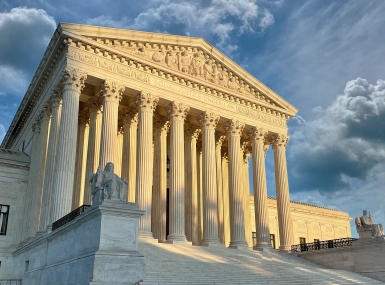Supreme Court Update: Muldrow v. St. Louis
Author
Upcoming Events
Related News

Supreme Court Update: Muldrow v. St. Louis
COUNTY NEXUS
In a season of acute workforce shortages, the ability to make lateral transfers without fear of legal action is an important tool for county governments to ensure we have appropriate staffing to meet our various responsibilities for safeguarding the safety, health and wellbeing of our residents.
BACKGROUND
In this case, an employee alleged that her lateral transfer within the St. Louis Police Department was motivated by gender bias and constituted discrimination under Title VII of the Civil Rights Act. However, the transfer did not impact her pay or title. This case involved a circuit split over the question of whether lateral employment transfers constitute an adverse employment action or if tangible harm must be evident.
NACo ADVOCACY
In a Local Government Legal Center amicus brief submitted in support of the respondents, NACo argued that local governments are collectively among the largest employers in the country and regularly transfer employees laterally as a matter of operational necessity, to provide training, to fill critical service needs, to accommodate an employee’s religious or disability needs, to investigate a claim of harassment, and to address staffing shortages. We suggested a ruling allowing all lateral transfers, regardless of associated material harm, to qualify as actionable adverse employment actions could profoundly impede the ability of local governments to assign police, fire, and EMS personnel where they are most needed.
CURRENT STATUS
On April 17, the Court issued a 6-3 decision vacating the lower court's ruling against the petitioner and creating a new standard under Title VII for lawsuits related to forced employee transfers. An employee must demonstrate "some harm" in a forced transfer suit, which is a lower threshold than the "material" or "significant" harm adopted by many lower courts. However, the Court did not go so far as to adopt the Petitioner’s proposed rule that any transfer, regardless of harm would be actionable under Title VII if based on a protected characteristic. Learn more here.
2024-2025 Supreme Court Term

NACo Legal Advocacy: Ames v. Ohio Department of Youth Services
As one of the largest employers in the country, counties have a significant interest in cases like Ames v. Ohio Department of Youth Services (Ames v. Ohio) that could expand county liabilities as employers.

NACo Legal Advocacy: City of Buffalo et al. v. Kia/Hyundai
The question at hand in City of Seattle et al. v. Kia/Hyundai is whether or not the Federal Motor Vehicle Safety Standard preempts state tort claims brought forth by local governments alleging that Kia and Hyundai’s failure to install “reasonable” anti-theft technology constitutes negligence and public nuisance.

NACo Legal Advocacy: Perttu v. Richards
Perttu v. Richards has implications on the Prison Litigation Reform Act (PLRA) and could increase the amount of Section 1983 inmate-initiated cases against county jails that reach federal court, ultimately resulting in counties having to expend resources on frivolous lawsuits.

NACo Legal Advocacy: McLaughlin Chiropractic Associates, Inc. V. McKesson Corporation
McLaughlin Chiropractic Associates, Inc. V. McKesson Corporation could make it more difficult for counties to challenge FCC orders, many of which have taken steps to preempt and curtail local authority by limiting counties’ abilities to manage their own right of way and assess fair market value permitting and impact fees on providers seeking to construct, modify or extend telecommunications infrastructure in their communities.

NACo Legal Advocacy: San Francisco v. Environmental Protection Agency (EPA)
San Francisco v. Environmental Protection Agency (EPA) has implications for the ability of county governments that own and operate wastewater treatment facilities to comply with National Pollutant Discharge Elimination System (NPDES) permit requirements.

NACo Legal Advocacy: Lackey v. Stinnie
Lackey v. Stinnie will impact the ability of state and local governments to avoid paying litigation fees in a civil rights case if they change their conduct (i.e. repeal a law) after a court has granted a preliminary injunction.

NACo Legal Advocacy: Bondi v. VanDerStok
Garland v. VanDerStok has implications for the ability of county law enforcement to uphold public safety and investigate crimes involving ghost guns.

NACo Legal Advocacy: Stanley v. City of Sanford
Stanley v. City of Sanford will impact the ability of county governments to balance budgets by reducing or eliminating post-employment benefits for disability retirees.

NACo Legal Advocacy: EMD Sales, Inc. v. Carrera
EMD Sales, Inc. v. Carrera could make it more difficult for county governments to prove exemptions under the Fair Labor Standards Act (FLSA), which would increase the potential for costly litigation.

NACo Legal Advocacy: Federal Communications Commission, et al v. Consumers' Research, et al
Federal Communications Commission, et al v. Consumers’ Research, et al. (FCC v. Consumers’ Research) could jeopardize what is known as the Universal Service Fund (USF). Through the USF, the FCC has provided billions of dollars to local governments and our residents, helping provide essential telecommunications and broadband services to unserved and underserved communities. FCC v. Consumers’ Research challenges the FCC’s legal authority behind the USF, putting multiple programs essential to equitable broadband deployment at risk.
Featured Initiative
Supreme Court Advocacy Hub

